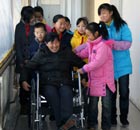Government and Policy
Water project alters flow of life along its route
By Qian Yanfeng (China Daily)
Updated: 2010-03-04 06:51
 |
Large Medium Small |
Because the rush for GDP growth still tops the agenda for local officials, pollution control is becoming an increasingly difficult task, he said.
Further north along the canal is Gengche town, where several hundred plastic processing factories discharge tons of detergent-rich wastewater directly into inlets of Luoma Lake, a key water storage lake for the eastern route.
People here have to dig as deep as 300 m to find clean drinking water after the plants contaminated their underground sources, said resident Xu Xiangdong, in his 60s. A decade ago, they only had to dig 30 m.
However, Xu is shrewd enough to know shutting down the factories is not the perfect solution. "We need those factories. Plastic processing has developed into the pillar industry of our town and that means jobs for us," he said.
Lu Xuanzhuang, a 16-year-old boy in nearby Shaji town, where the Xuhong River serves as another auxiliary channel for the SNWD project, said he does not see any benefit in divesting large tracts of farmland to build a new industrial park. More than 10 factories, including chemical and clothing plants, have opened since its construction and all pump wastewater straight into waterways connected to the river.
"I don't think those factories have brought anything other than pollution," he said. "Despite the job opportunities they offer, my parents are still unwilling to come back from the big cities where they can earn more."
While authorities attempt to build comparatively centralized treatment facilities in sprawling townships and villages, officials are also urging farmers to use less pesticides and fertilizers, said publicity officer Wang. However, changing the ingrained rural mindset will be no easy task, warned Wang Dezheng, a 62-year-old farmer in Daqiao town, which falls under Jiangdu's administration and sits on the upper reaches of the eastern route's water intake. He said most people in the countryside lack education and strongly believe that "the more pesticides they use, the better".
Algae fed by the fertilizers have already starved the oxygen from most of the waterways around Daqiao, causing a major depletion in the number of fish, said the farmer, who spends his spare time studying the environmental impact of agricultural products. "The government needs to actively educate people, not just encourage them," he said.
Wang at the Jiangdu environmental protection bureau added that identical chemical industrial parks built along the Yangtze River over the last two decades, such as in the provincial capital Nanjing, as well as Yizheng and Yangzhou, pose a real threat to the eastern route of the SNWD project.
Hou Yizhong, an official with the Yizheng environment protection bureau, hit the headlines last May for his calls to have the Yangzhou Chemical Industry Park relocated. He spent years arguing that the potential environmental hazards were "obvious".
"The common problem with China's pollution control initiatives is there are always loopholes in project implementation despite strict laws and rules," said Huaihe River protection officer He Dejin. "Local governments need to strengthen management and supervision and find a way to address environmental issues comprehensively."
(China Daily 03/04/2010 page1)







